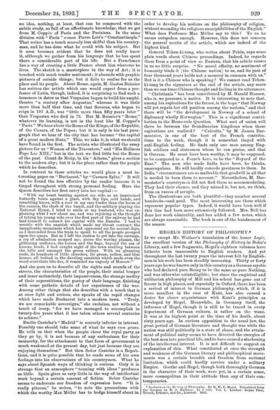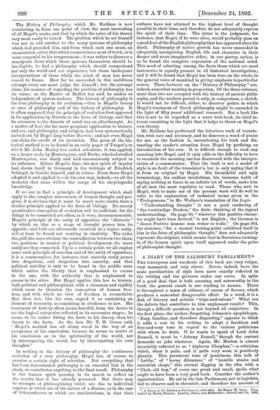HEGEL'S HISTORY OF PHILOSOPHY.*
IF we except Mr. Wallace's translation of the lesser Logic, the excellent version of the Philosophy of History in Bohn's Library, and a few fragments, Hegel's eighteen volumes have hitherto been inaccessible to English readers. And yet throughout the last twenty years the interest felt by English- men in his work has been steadily increasing. Thirty or forty years ago he was known only in this country as a. German mystic who had declared pure Being to be the same as pure Nothing, and was otherwise unintelligible ; but since the empirical and utilitarian philosophy of Mill and his school has gone out of favour in high places, and especially in Oxford, there has been a revival of interest in German philosophy, which, if it is more manifest in the case of Kant, has also caused a desire for closer acquaintance with Kant's principles as developed by Hegel. Meanwhile, in Germany itself, the influence of Hegel, though it is still to be traced in every department of German culture, is rather on the wane. It was at its highest point at the time of his death, about sixty years ago. In curious opposition to the usual law, the great period of German literature and thought was while the nation was still politically in a state of chaos, and the attain- ment of political unity seems to have diverted the energies of the best men into practical life, and to have caused a slackening of the intellectual interest. It is not difficult to suggest an explanation of this. What constituted at once the strength and weakness of the German literary and philosophical move- ments was a certain breadth and freedom from national limitation, which could hardly survive under a military
Empire. G-oethe and Hegel, though both thoroughly German in the character of their work, were yet, in a certain sense, more cosmopolitan in their attitude than any of their con- temporaries.
• Lectures on the Ili•tory of Philosophy. By G. W. F. IlegeL Tratuslated from the German by B. S. Haldane. In 3 vols. Vol. L London : Kogan Paul, Trench, TrO.bner, and Co., Limited. 1892. The History of Philosophy, which Mr. Haldane is now translating, is, from one point of view, the most interesting of all Hegel's works, and that by which the value of his theory may most easily be tested. The problem which he set himself was not to add another to the many systems of philosophy which had preceded him, and from which each one must, on examination, select that which seems to have most of truth, or is most congenial to his temperament ; it was rather to discover a standpoint from which those systems themselves should be intelligible, to find a philosophy which should comprehend not only the world and our experience, but those inadequate interpretations of these which the mind of man has never ceased to frame. How far he succeeded in this ambitious attempt every one must judge for himself ; but the attempt alone, his manner of regarding the problem of philosophy, has its value ; as the Master of Balliol has said, he makes us independent of system-makers. The history of philosophy is the true philosophy in its evolution,—that is Hegel's theory at once of philosophy and of the history of philosophy. It is often supposed that the principle of evolution first appeared in its application by Darwin to the facts of biology, and that its extension to the domain of mind was an afterthought. As a matter of fact, the far more pregnant application to history, and art, and philosophy, and religion, had been systematically carried out by Hegel long before Darwin ; and not even Hegel can claim the credit of its invention. The germ of the his- torical method is to be found in an early paper of T argot's, to which Mr. John Morley has called attention; it was applied, on a larger scale, by Montesquieu ; and Burke, who had studied Montesquieu, was dimly and half-unconsciously subject to its influence. Before Hegel's time, the new spirit of inquiry had shown itself in Germany in the writings of Friedrich Schlegel, in Goethe himself, and in others. From these Hegel adopted it and applied it,—in his own way, indeed,—to all the material that came within the range of his encyclopa3dic knowledge.
If we are to find a principle of development which shall apply to the complex movements of human thought and pro- gress, it is obvious that it must be much more elastic than a similar principle applied to the facts of biology. No merely quantitative conception of evolution will be sufficient, for the things to be connected are often, as it were, incommensurable. Hegel's principle of the unity of opposites, the " dialectic " by which an idea or a stage of thought passes into its opposite, and both are afterwards reunited in a higher unity, will at least be found not wanting in elasticity. The wider the gulf, the more obvious the contradiction between two ideas, two positions in mental or political development, the more easily are they connected. Up to a certain point, we all employ some such principle of reaction and of the unity of opposites ; it is a commonplace, for instance, that anarchy easily passes into despotism,, and despotism into anarchy, and that political stability is only to be found in the middle state which unites the liberty that is emphasised to excess in the one, with the authority that is emphasised to excess in the other. But Hegel applies this law to history, both political and philosophical, with a closeness and rigidity which seem to threaten the conception of human free- dom, and with which no view of freedom is reconcilable that does not, like his own, regard it as containing an element of necessity, as consisting in obedience to law. His treatment of history often seems fanciful, from the desire to see the logical categories reflected in its successive stages ; he seems to be rather fitting the facts to his theory, than his theory to the facts. As the late Mr. T. H. Green said, "Hegel's method has all along stood in the way of an acceptance of his conclusion, because he seems to arrive at his conclusion as to the spirituality of the world, not by interrogating the world, but by interrogating his own thoughts."
In seeking in the history of philosophy the continuous evolution of a true philosophy, Hegel has, of course, to exercise a certain right of selection. Not everything that has been denominated philosophy is an essential link in the chain, or contributes anything to the final result. Philosophy is the human spirit pausing in its march to reflect on the results that it has already garnered. But there may be attempts at philosophising which are due to individual caprice, or which are of the nature of a disease, as in the case of Schopenhauer, or which are anachronisms, in that their authors have not attained to the highest level of thought possible in their time, and therefore do not adequately express the spirit of their time. The latter is the judgment, for instance, that Hegel, if he were alive, would probably pass on a good deal of the English philosophy that has appeared since his death. Philosophy of native growth has never succeeded in adequately interpreting English life and character in their deeper and more imaginative sides; in our poetry, rather, is to be found the complete expression of the national mind. This need of selecting among the facts those which are most instructive is equally present in all historical investigation; and it will be found that Hegel has been true, on the whole, to the general voice of mankind in giving emphasis to particular names. These lectures on the "History of Philosophy" are, indeed, somewhat wanting in proportion. Of the three volumes, more than two are occupied with the history of ancient philo- sophy, and the modern period is only, in comparison, a sketch. It would not be difficult, either, to discover points in which Hegel's treatment of Greek philosophy might be amended in the light of fifty years' additional research. But a book like this is not to be regarded as a mere text-book, its chief in- terest consisting in the light that it helps to throw on Hegel's own theory.
Mr. Haldane has performed the laborious work of transla- tion with care and accuracy, and he deserves a word of praise for not as the fashion is, encumbering his book and dis- tracting the reader's attention from Hegel by prefixing an introduction of his own. It is difficult enough to read any meaning into Hegel, and it only adds to the difficulty to have to reconcile the meaning one has discovered with the interpre- tation of a commentator. That the book is not a model of style is no fault of the translator's, but is only saying that it is from an original by Hegel. His formidable and ugly terminology, his endless involutions, his tiresome habit of saying nothing at times in an infinite lot of words, make him of all men the most repulsive to read. Those who, new to Hegel, wish to make use of the present work will do well to refer to the explanation of technical terms given in the " Prolegomena " to Mr. Wallace's translation of the Logic.
"Understanding thought" is not a good rendering of " das verstandige Denken," the finite thinking of the logical understanding. On page 60, "wherever this positive charac- ter might have been derived," is not English ; the German is " dieses Positive komme nun woher es wolle." On page 384, the sentence, "for a mental turning-point exhibited itself in him in the form of philosophic thought," does not adequately represent the original, which means that in Socrates a turning. in of the human spirit upon itself appeared under the guise of philosophic thought.



































 Previous page
Previous page